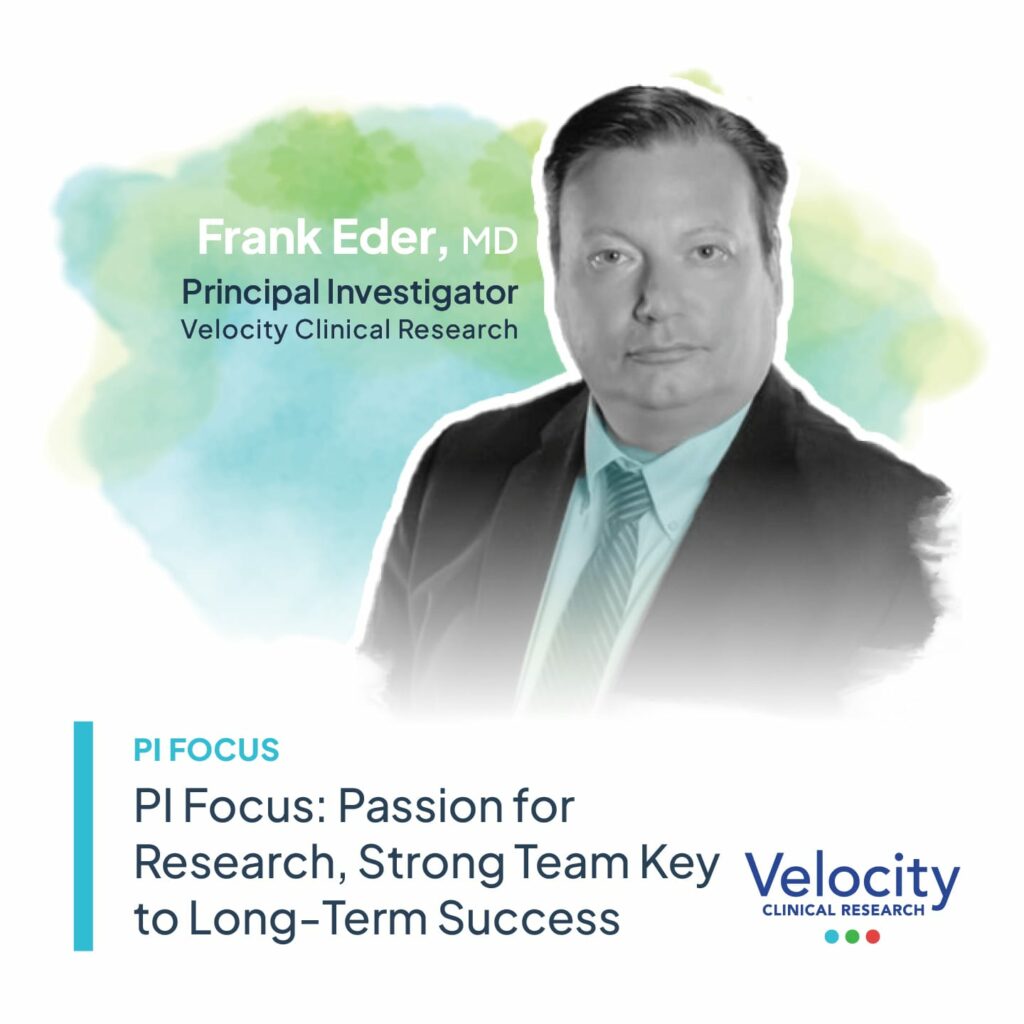With nearly three decades as a family physician and almost 25 years as a Principal Investigator (PI), Frank Eder, MD, believes two primary elements are critical for sustained success in clinical research.
“You must have a true interest in the research side of it. You have to actually be interested in the science and the advancement of where things are going in medicine,” he says. But passion alone isn’t enough. “I think the other part of it is you need to have a good team around you. And if you don’t have the infrastructure and [a team adequately equipped] to run trials, it really is difficult to maintain doing trials.”
Dr. Eder practices at Velocity’s research site in Binghamton that partners with United Health Services (UHS) to conduct clinical trials for a broad range of investigational products. Dr. Eder is a lead physician for UHS and is board-certified in family medicine. He received his medical degree from SUNY Downstate Medical Center in Brooklyn, NY, and completed a family medicine residency at United Health Services Hospitals in Johnson City, NY.
Dr. Eder is one of many Velocity PIs who have bucked a troubling trend in the clinical trial industry, which for years has suffered the consequences of the so-called “one and done” phenomenon among PIs. Simply stated, too many new PIs jump into clinical trials and find it more difficult or less rewarding than expected, and never return. The result can be slower, less effective trials.
It’s a chronic problem, though there was some positive news recently. A 2022 analysis by the Tufts Center for the Study of Drug Development (CSDD) found that the segment of PIs who leave research after conducting a single trial dropped to 66% in 2020 from 70% in 2015.
“Up until this most recent analysis, we were observing a highly fragmented investigative site landscape that was dominated by a very high proportion of novice investigators, many that were coming in really in response to growing interest in rare disease-targeted clinical trial activity,” Ken Getz, CSDD Director told CenterWatch Weekly. For decades, the largest, highest-volume and most-experienced sites have made up only a small percentage of research regulated by the FDA.
CSDD’s study found that the number of PIs conducting two to three trials per year increased in 2020 to 23% from 22% in 2015, while the number of PIs conducting more than four trials went up to 11% in 2020 from 8% in 2015.
Turnover rates are still quite high, particularly among novice investigators, Getz told CenterWatch. PIs with more experience and activity in trials generally drop out of research at a much lower rate. It’s this growing presence of more active PIs (and declining numbers of one-and-done PIs) that appears to be helping reverse turnover trends in the U.S. and Canada.
Dr. Eder is especially excited about clinical trial work he’s done of late with the potential to stem the national obesity epidemic. “It’s not a cosmetic issue, it’s a health issue,” Dr. Eder says, noting that overweight bodies are far more susceptible to heart disease, diabetes, hypertension, and other serious health risks. Those in turn can cause strokes, heart attacks, and other maladies.
“Obesity has increased dramatically, not just the number of people who are obese in this country, but the amount of obesity,” he says. “And if you look at BMIs now, compared to 20 years ago, they’re much higher than they have ever been. And, if we continue on this track, most people in this country will be obese within the next 10 years. Think about the toll that takes on the patient, their families, healthcare institutions, and others. We don’t have the ability to deal with that,” Dr. Eder says, stressing the need for clinical trials and other preventive measures.
We can blame our caveperson ancestors, in part, for today’s obesity problem, Dr. Eder says, and clinical trials are going to the gut of the matter.
“Trials are helping produce new classes of medications that get to some of the core problems neurologically – in the gut and brain. We’re seeing a wealth of studies coming down the line [helping to produce] new medications that can cause significant amounts of weight loss, almost [equal] to what you get with bariatric surgery.”
Some of the clinical trials Dr. Eder and team have contributed to may result in significant weight loss without the trauma of surgery to the body, adding, “That’s a huge advancement.”
Dr. Eder is excited about a “new understanding” of obesity as a disease. “I guess the best way to describe it is sort of the neuroendocrine function of the body. You know, years ago when we lived in caves and we had famines, our bodies had to figure out how to adjust the metabolism to hold onto fat tissue. Today, we don’t have that anymore in this country specifically. But we’ve never lost an evolutionary mechanism [to retain fat for leaner times],” Dr. Eder says.
“When we are eating in times of feast, some bodies don’t understand that you don’t need to save that up for the next famine, because the famine’s not coming. [Those bodies] will gain a lot of weight, then they will starve themselves, and they might lose a few pounds, but it just strengthens that mechanism, and they’ll gain more [weight] back. Because they’re not getting rid of the fat tissue, they’re just teaching their body to hold onto it even harder,” Dr. Eder explains.
Some turn to exercise believing it alone will solve their weight gain issue. Unfortunately, Dr. Eder says, it’s not so simple. “People start working out harder and then that creates a cortisol effect of the body being stressed. And once again, you have this mechanism that says, well, we need to survive, so let’s hold on to that fat as long as possible.”
“Clinical trials are helping drive the development of potentially game-changing medications that address the core of [the issue] and teach the body it doesn’t have to retain fat cells to prepare for a famine. It’s an exciting time to be a PI,” Dr. Eder adds.
To learn more about Frank Eder, MD and his team in Binghamton, or to work with them on a future trial, visit velocityclinical.com/locations/velocity-clinical-research-binghamton.
To join a clinical trial at Velocity, visit velocityclinicaltrials.com.

